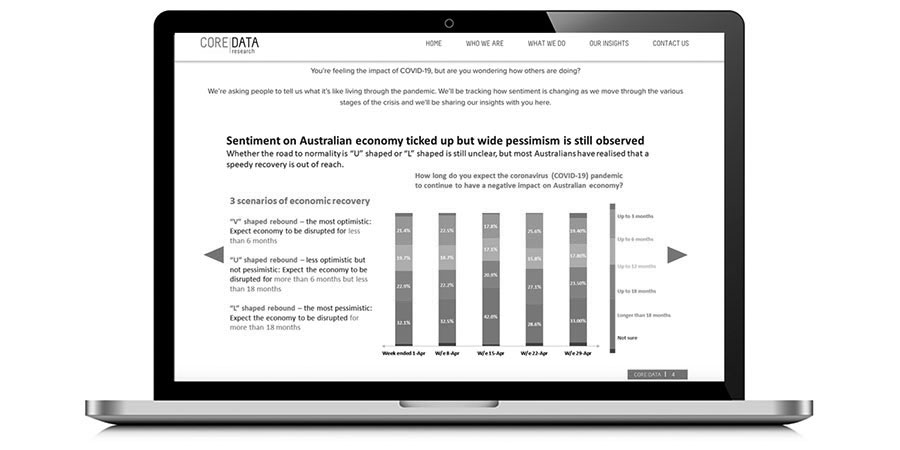
While millennials are feeling the effects of the pandemic on their mental health and wellbeing, CoreData research shows baby boomers are being hit harder in the hip pocket by COVID-19.
Data from CoreData’s weekly COVID-19 Pulse Check reveals that on average, millennials estimate the crisis will have a $26,018 impact on their household, while baby boomers put that number at a whopping $54,216. While fewer than one in five (18.9 percent) millennials (aged between 26 and 40) expect COVID-19 to impact their personal finances for more than a year, more than twice as many (38.5 per cent) baby boomers (those aged between 55 and 74) expect the virus to impact their personal finances for up to 18 months or longer.

Obviously, the benefit of time means many baby boomers will have a larger asset base than millennials, and are less likely to be still working full time, meaning they may be more heavily reliant on income from investments to fund their lifestyle (and hence exposed to market volatility). Their age means they’ve also got less time to make up any retirement shortfall.
Despite this, it’s millennials who seem to be feeling the pressure. While less than two thirds (58.9 per cent) of baby boomers have reduced their discretionary spending, nearly three quarters (72.0 per cent) of millennials have done so to minimise the impact on their personal financial situation. Likewise, only 6.8 per cent of baby boomers have applied for financial support or a loan, less than half the proportion of millennials that have done so (16.0 per cent). And nearly half (46.2 per cent) have cancelled subscriptions for services such as gyms and online streaming, compared to less than one in five (18.6 percent) baby boomers. While fewer baby boomers may have had such memberships to cancel in the first place, the differences in expense reduction and loan seeking may be explained by the fact that older Australians are more likely to have a comprehensive safety net to fall back on.
Millennials (56.2 per cent) and baby boomers (51.6 per cent) both largely identify personal savings as their safety net during times of financial hardship, however millennials are more likely to fall back on picking up extra work, such as a second job or a side hustle, or seeking financial support from family or friends. Baby boomers are more likely to have passive income streams, via rental properties, investments or other alternative sources. Indeed, nearly one third (30.7 per cent) of baby boomers disclosed having some form of income from such a source, compared to one in six (16.2 per cent) millennials.
COVID-19 taking a toll on millennials’ mental health
Interestingly, while baby boomers are expecting a larger hit to their personal finances, millennials appear to be carrying a heavier mental burden. While there is a slightly higher prevalence of depression among the older generation, with one in 10 (11.1 per cent) baby boomers reporting feeling depressed recently compared to 8.2 per cent of millennials, the younger generation is typically more anxious and overwhelmed.
More than a third (34.8 per cent) of millennials reported feeling anxious, compared to a quarter (25.8 per cent) of baby boomers, and twice as many millennials (18.3 per cent vs. 9.8 per cent) admitted feeling overwhelmed. It’s likely that the different life stages of the two groups is having a bearing on their ability to cope, with many millennials of working age dealing with job insecurity and potential job loss, as well as raising a family. With less time under their belt to build a significant asset base, most will be highly reliant on their job to fund their mortgage and other financial obligations, while some may be single income families with a stay-at-home parent.
Furthermore, more than half (53.7 per cent) of millennials are feeling socially isolated and cut off from the rest of the world as a result of the public health restrictions introduced in response to COVID-19, compared to fewer than two in five baby boomers (38.5 per cent). Life stage may also play a role in this, with more millennials (31.0 per cent) telling us they are currently single than baby boomers (9.5 per cent), and thus perhaps more likely to be living alone and feeling the effects of being isolated from family and friends.
We all know money doesn’t equal happiness, and CoreData’s Best Possible Retirement research provides evidence of that, but there’s no doubt that any threat to our financial security can be stressful and difficult to handle. It could be argued that future generations are paying a heavy price to keep older generations safe, yet it appears that price may be mental, more than financial.
Only one in five Australians (22.5 per cent) believe younger Australians should be financially compensated for following social restriction measures which are primarily to protect older generations. And while millennials are more likely to believe this should happen than baby boomers (22.5 per cent vs. 14.0 per cent), the majority disagree (57.0 per cent). COVID-19 has impacted people in many different ways, but there’s one thing that unites us all: we’re all in this together.

